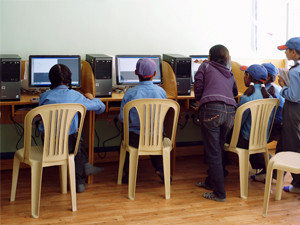
The Gauteng government has issued a tender for the controversial R3 billion Gauteng Online schools project, as its contract with SMM Telematics Consortium (SMMT) comes to an end.
The project has been dogged by controversy for several years, with the Democratic Alliance (DA) arguing it has been a failure as PCs are not replaced when stolen, and schools are not connected to the Internet.
According to an advertisement placed by the Gauteng Department of Finance, the request for proposals is for "innovative solutions to deliver the Gauteng Online (GOL) schools programme". However, the department refuses to provide any information relating to the scope of the tender, arguing that this would jeopardise the process.
The department will hold a compulsory briefing next Friday, at which more details are expected to be revealed. The closing date for bids is 18 February and copies of the tender can be obtained for R5 000.
The total budget for this project over a five-year period is R3 billion and, as of May last year, about R1.3 billion had been spent. This translates to approximately 65% that was spent on the project, while 71% of the project deliverables have been achieved, with the rest of the project set to be completed by the end of this financial year.
Big aims
The programme was initiated in 2002 through the Gauteng Department of Education and implemented by various service providers. In April 2007, GOL was transferred from the Gauteng Department of Education to the Gauteng Department of Finance, and the contract awarded to SMMT.
The key objectives are to "create a sustainable school-based e-learning environment" in which every learner has an e-mail address, as well as free Internet access. It also aims to implement a technology-enabled learning environment.
SMMT's contract, awarded in December 2007, was set to run for five years. So far, around 1 557 schools have been equipped with standardised laboratories, which formed part of phase one of the project.
The remaining 630 schools that are part of the second phase of the project will be completed through the alternative design of the Computer on Wheels solution. Statistics indicate GOL is operational in 1 557 schools in the province, while more than 700 000 learners and 38 000 educators use the network every day.
Failure
However, the DA in Gauteng has said the project has been characterised by poor management and non-adherence to the service level agreement.
DA Gauteng education spokesperson Khume Ramulifho has stated the Department of Finance conducted an internal audit and concluded the project's primary objectives have not been achieved.
Ramulifho has also said schools are not able to effectively implement a technology-enabled learning environment and the IT infrastructure in schools is under-used.
Having only 25 PCs in schools is not sufficient, says Ramulifho, and newer technology such as tablets should be used. He says the project has not been completed, and only about 720 schools are actually connected to the Internet.
Ramulifho adds that many schools are not connected, which defeats the purpose of the project. He says the tender process must be transparent.
In August, the department said the rollout is "progressing as planned" and will be completed within the set timelines.
Share